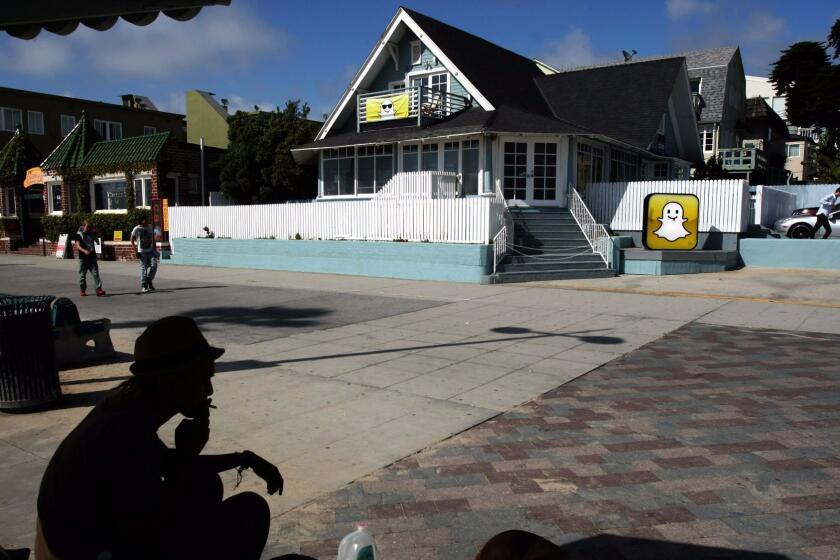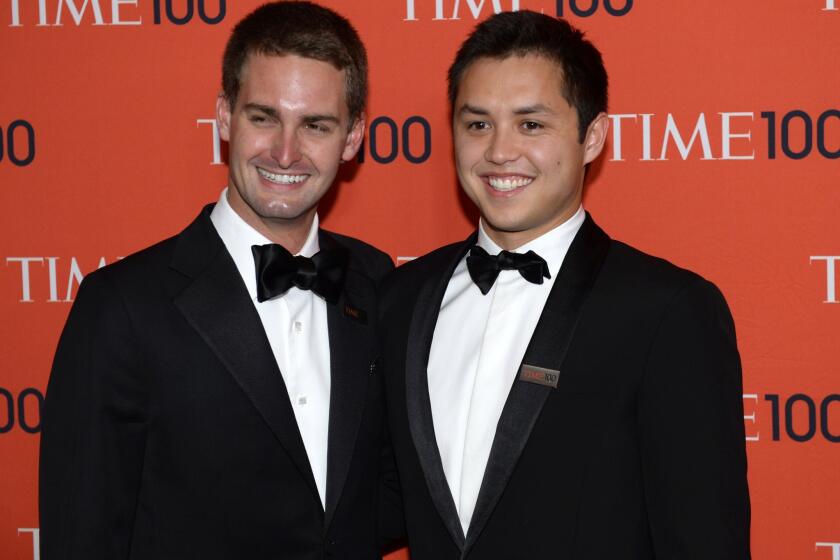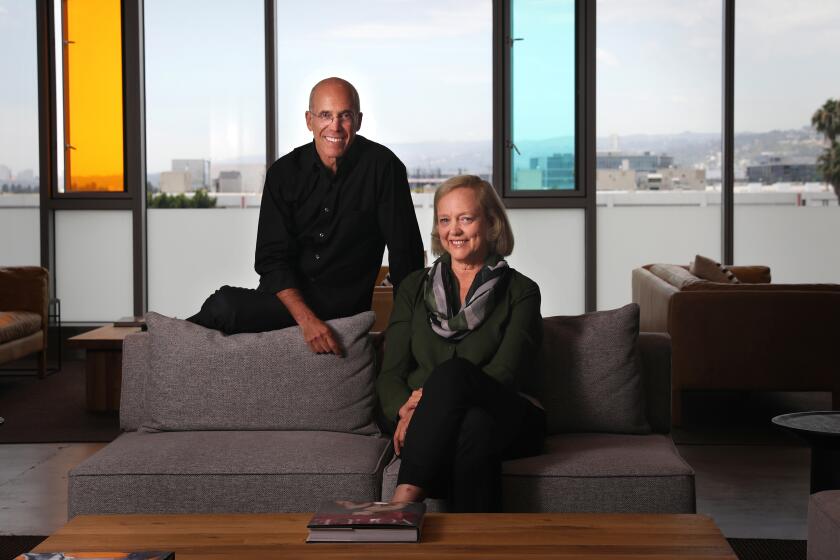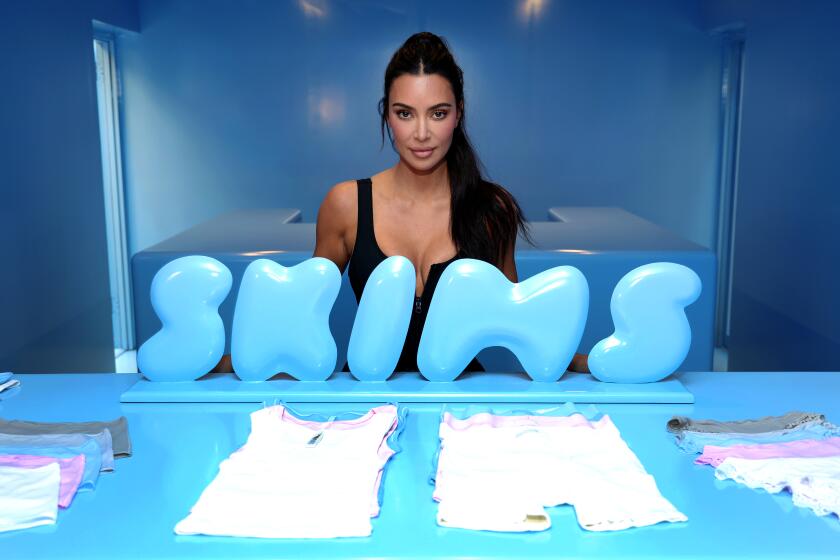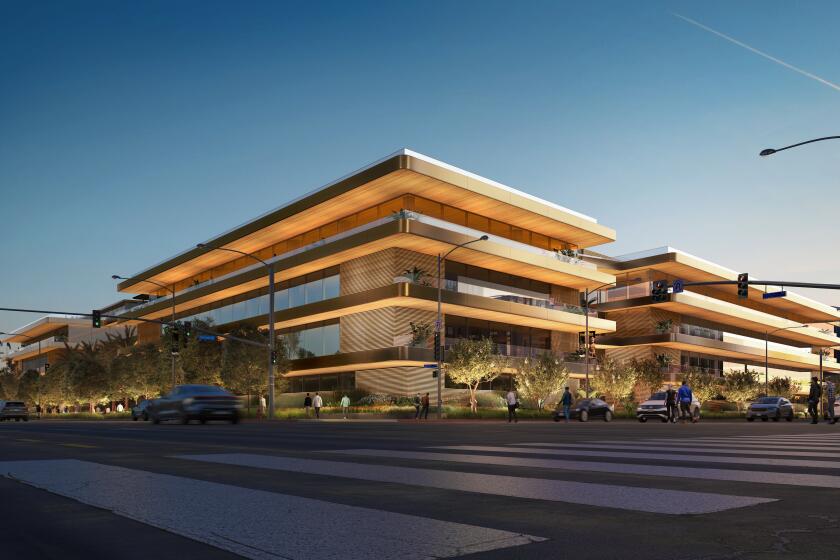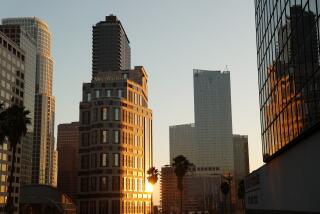Why Silicon Beach didn’t live up to the hype as an L.A. tech powerhouse

- Share via
High atop a Century City tower with floor-to-ceiling views of the Westside, a group of venture capitalists, other investors and startup founders picked at charcuterie boards, sipped drinks and debated the future of tech ventures in the Los Angeles area.
The mood was upbeat. L.A. is a sleeping tech giant, they said, home to a diverse range of successful companies, including dating app Tinder, Riot Games and Hawthorne-based SpaceX.
But when the subject turned to the once-hyped Silicon Beach, there were grimaces.
“We don’t need to be the ‘silicon’ of anything,” said one attendee.
“It does L.A. a bit of a disservice,” remarked another.
It’s a delicate subject among investors and local tech entrepreneurs — for good reason.

Subscribers get exclusive access to this story
We’re offering L.A. Times subscribers special access to our best journalism. Thank you for your support.
Explore more Subscriber Exclusive content.
Last year, venture capital funding of startups in Greater Los Angeles totaled $6.9 billion, down 73% from 2021, when investment peaked during the height of the COVID-19 pandemic, according to research firm CB Insights. Investment in the L.A. tech sector during the same period dropped 63% to $4.2 billion, CB Insights said.
The sharp falloff highlights the challenges L.A. has faced in trying to retain its perch as a major tech hub and how it fell short of lofty goals to promote itself as an alternative to Silicon Valley and New York, the biggest U.S. markets for venture capital. Last year, L.A. dropped to fourth place, behind those areas and Boston, in VC funding, according to CB Insights.
“We’re certainly a lot further along than where we started, but ... it boggles my mind that there isn’t more tech here in the second-largest city in the country, the third-biggest metropolitan economy in the world, behind Tokyo and New York,” said former Mayor Antonio Villaraigosa, a key player in establishing Silicon Beach.
Los Angeles is home to hot tech firms such as Snap Inc. and Tinder, but Silicon Beach still has a long way to go to rival the tech industries of Silicon Valley or San Francisco.
What happened? During the pandemic, tech investment surged and reached a peak in 2021, as newcomers entered the market, hyped by cryptocurrency, blockchain and the metaverse.
Then reality set in. The 2022 Russian invasion of Ukraine, interest rate hikes and the collapse of the currency exchange FTX fueled fears of another tech bubble and cooled investments in startups.
“When everything kind of flips, you have many of these investors pulling back, retreating, writing smaller checks, and a lot of the access to capital that tech companies had for years gets restricted pretty quickly,” said Alex Lee, research editor at CB Insights. “We’re still in the fallout period of that.”
The decline in venture capital funding was worse in Southern California than in the nation as a whole, where such investment has dropped 58% since 2021, CB Insights said.
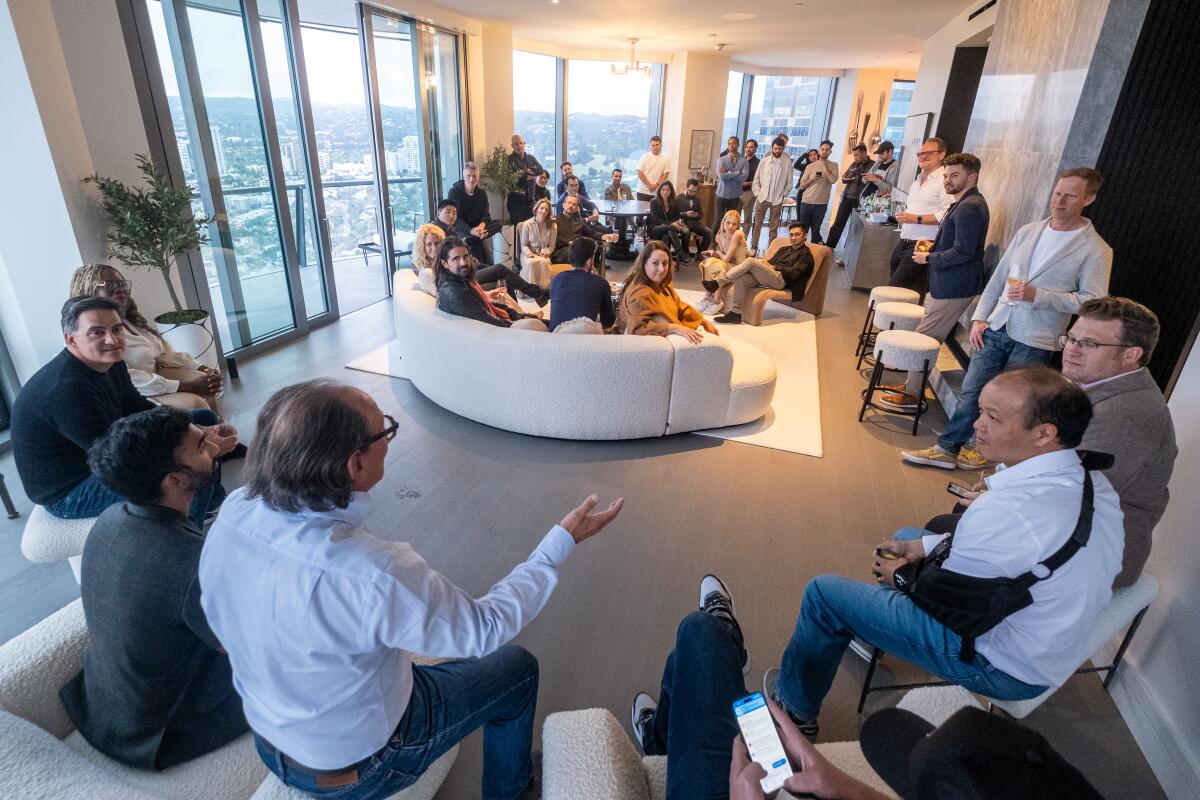
Notably, Silicon Beach — the corridor that includes Santa Monica, Venice and Playa Vista and has the highest concentration of tech companies in the county — had 1.04 million square feet of vacant sublease space in the first quarter, up 5% from the same period a year ago and 25% from 2021, according to CoStar, which tracks real estate data.
One major challenge, industry observers say, is that L.A. lags behind other tech hubs when it comes to attracting late-stage financiers who help companies grow to the next level after the startup phase.
L.A. also has struggled to compete with Silicon Valley in the burgeoning area of artificial intelligence. Some of the biggest players in that space — Anthropic and OpenAI, creator of ChatGPT — are based in San Francisco.
In the first quarter of this year, L.A.-based startups drew just 1% of all AI funding in the U.S., Lee noted.
“L.A. has nowhere near as much AI activity as hotbeds of activity like Silicon Valley or New York,” Lee said.
Josh Peng, co-founder and general partner of TrueNorth Capital, an early-stage investor in AI infrastructure firms, said an intellectual community has been built in San Francisco that allows AI workers to meet and bounce ideas off one another, which is “unfortunate for investors living in L.A.”
Peng, who grew up in Thousand Oaks and attended USC, is the only one of TrueNorth Capital’s three founders in Southern California. His partners are in Northern California.
Washed Out is the first major music artist to commission a music video using OpenAI’s Sora text-to-video technology.
“There’s no question that AI is having a moment, and it’s in the midst of a huge funding boom, which is benefiting the Bay Area at the expense of L.A.,” said Spencer Rascoff, former executive chairman of dot.LA and general partner at startup studio and venture fund 75 & Sunny.
In the heady days of April 2012, hundreds of people packed a town hall meeting in Venice dubbed “The Emergence of Silicon Beach.” Los Angeles City Councilman Bill Rosendahl proclaimed that the beachside community was experiencing a “Venicessance,” as dozens of tech companies planted roots.
Rather than going to the Bay Area for funding, the plan was to have L.A. entrepreneurs and engineers build a concentration of startups and tech talent — similar to the Mission District in San Francisco — that would attract jobs to the Westside, particularly Venice, Playa Vista, Santa Monica and Culver City.
Early signs were promising. Google opened offices in the Binoculars Building in Venice and later in the sprawling former Spruce Goose hangar in Playa Vista. Meta (then known as Facebook) also moved into Playa Vista.
City leaders had high hopes that Snap — creator of the disappearing messaging app Snapchat, which operated out of a beachfront bungalow on the Venice boardwalk — would serve as the anchor for the region’s innovation.
“Snap’s IPO is a historic multiplier for our city’s tech sector,” Los Angeles Mayor Eric Garcetti said in 2017.
Snapchat is on track to hold the biggest initial public offering of stock for a Los Angeles company, yet none of the region’s major start-up investors stand to profit.
But Snap stumbled. The company, which later relocated to Santa Monica, faced a series of setbacks and has struggled to gain older users in the social media space, with its Snapchat app remaining a distant rival to Instagram and TikTok.
Snap’s stock closed Friday at $16.05 — less than its IPO price of $17 seven years ago. In February, the company laid off 10% of its staff amid a slump in advertising spending.
Some of Southern California’s most recent tech IPOs have struggled too. For example, Irvine-based Rivian Automative Inc., which began trading publicly in 2021, laid off 10% of its workers in February as it confronted falling demand for electric vehicles.
Bird, a scooter company founded in Santa Monica, also floundered, moving its headquarters to Miami and filing for bankruptcy last year. Its assets were sold in April to Miami-based Third Lane Mobility for $145 million, a far cry from Bird’s 2019 valuation of $2.5 billion.
The streaming service launched by Jeffrey Katzenberg and Meg Whitman failed to gain traction following its launch in April.
Digital news outlet dot.LA, which launched in 2020 with ambitions to aggressively cover Silicon Beach’s tech scene, built its business model around hosting live events. But the outlet laid off its editorial staff last year and in April announced it had been acquired by tech and media startup HouseVenture Inc.
“We really want to be a positive news site for the L.A. tech ecosystem,” said Mike Chang, co-founder of HouseVenture, adding that he plans to hire at least five reporters in the next three months.
To be sure, tech giants Apple and Amazon have transformed Culver City, investing significant resources and staff to build out their entertainment studios.
But other major tech players have retrenched amid industrywide layoffs.
Facebook has listed half its office space in Playa Vista for sublease, according to CoStar.
Google opted not to open offices in Westside Pavilion after signing a 14-year lease. The company’s YouTube division has moved away from original productions such as the series “Cobra Kai,” which went to Netflix.
Sublease space in Silicon Beach “has gone up more than almost anywhere else in Greater Los Angeles, and that, to me, is a really direct relationship with what’s been going on in the tech sector,” said Ryan Patap, senior director of market analytics for CoStar.
Some local investors are hopeful that L.A. will bounce back, noting that prominent Silicon Valley venture firm Andreessen Horowitz, or a16z, in 2022 announced plans for a new office in Santa Monica.
There are positive signs. In the first quarter, venture capital funding in the L.A. region totaled $2.5 billion, up 79% from the same period a year ago, according to CB Insights.
Sign up for This Evening's Big Stories
Catch up on the day with the 7 biggest L.A. Times stories in your inbox every weekday evening.
You may occasionally receive promotional content from the Los Angeles Times.
Backers note that venture capital does not factor all investment into startups, and there have been success stories. Among them is ZipRecruiter, the Santa Monica-based job posting firm that went public in 2021.
What’s more, the growth of SpaceX has fueled aerospace startups in El Segundo and Long Beach, underscoring the diversity of L.A.’s tech sector.
“We’ve got a variety of different industries here that are healthy and all support innovation,” said Anna Barber, a partner at Santa Monica-based M13, an early-stage venture capital firm.
Kardashian’s celebrity shapewear brand raked in $330 million in venture capital funding last year, the second-highest among L.A.-area companies. Retail stores are next.
Los Angeles “feels like how New York was 10 years ago,” said Jennifer Byrne, general partner at Grit Capital Partners and a former New York resident. “Right now, it seems the community is just getting started.”
The region has long suffered a brain drain of top talent, although that’s beginning to change.
Hollywood talent agencies and producers have met with AI companies, including ChatGPT maker OpenAI, to learn about how their technologies could be used in entertainment.
“The problem with L.A. historically is that our best and brightest engineers, if they wanted to do startups, they had to go to Northern California, because that’s where all the capital was. But that’s no longer the case,” said Mark Suster, managing partner of Santa Monica-based Upfront Ventures.
L.A. Mayor Karen Bass, whose term started at the end of 2022, “has worked to speed up review times for businesses and developments within city departments and is making more resources and training available to people who are looking to start and grow their businesses,” including those in Silicon Beach, her spokesman Zach Seidl said in a statement.
The question of how to market the L.A. region is still debated. To some, the term “silicon” seems outdated and overused. (New York was once known as “Silicon Alley,” and Salt Lake City was referred to as “Silicon Slopes.”)
Investor Brandon Hoffman, whose group Emerging LA hosts local tech events, quipped that a tagline might be “Generative Hollywood.”
After all, he said, San Francisco’s Hayes Valley neighborhood is known as “Cerebral Valley.”
Times staff writer Thomas Suh Lauder contributed to this report.
Apple will break ground on a new office this year on the Culver City-Los Angeles border that will house up to 2,400 employees, raising concern among some residents that it will increase their rent.
More to Read
Sign up for This Evening's Big Stories
Catch up on the day with the 7 biggest L.A. Times stories in your inbox every weekday evening.
You may occasionally receive promotional content from the Los Angeles Times.
